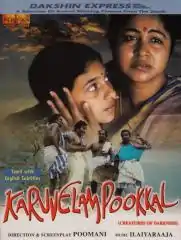| Karuvelam Pookkal | |
|---|---|
 | |
| Directed by | Poomani |
| Written by | Poomani |
| Produced by | National Film Development Corporation of India |
| Starring | Nasser Radhika Thalaivasal Vijay Charle |
| Cinematography | Thangar Bachan |
| Edited by | B. Lenin and V. T. Vijayan |
| Music by | Ilaiyaraaja |
Release date |
|
Running time | 130 minutes |
| Country | India |
| Language | Tamil |
Karuvelam Pookkal is a 2000 Indian Tamil-language film, directed by Poomani. It was jointly produced by National Film Development Corporation of India, and Doordarshan. It stars Nasser, Radhika, Thalaivasal Vijay and Charle among others. The film's music is composed by Ilaiyaraaja.[1]
Plot
It is a graphic picture of the abject misery of the rural poor. Its hard hitting message screams at you from the screen, loud and clear. Hitherto, there seemed to be only a couple of angles to Child labour in India, viz., children losing out on their carefree childhood and basic formal education. But there are so many other unthought of issues too, says scriptwriter and director Poomani, through the film Karuvelam Pookkal, jointly produced by NFDC and Doordarshan.
Karisalkulam, a small village, is inhabited mainly by Farmers. When the arid land offers them nothing but penury, enter the match factory owners from nearby villages. They lure the credulous, illiterate villagers into sending their daughters to work at the factories from dawn to much after dusk. The initial euphoria of a steady income gives way to despair, as is clearly brought out through the story of Nallamuthu (Nasser), his wife Vadivu (Radhika) and their three children. Mariyappan (Charle) is the Match factory agent in charge of finding child labourers for the factory. While the children slog in the factories the men of the household become lazy appendages who spend their time getting drunk. Nasser, as the cynical father, who does not wish to get his daughter married because he does not want to forgo the income, has rendered a splendid performance in Karuvelam Pookal. Mention must be made of the scenes in which he cries aloud at his tragedies and when his impotent anger is turned towards the agents of the match factories. Radhika's is another sterling portrayal. In the role of a responsible mother caught between her husband's apathy and avarice and her children's untold suffering, she indeed lives the character. Sonia is the eldest daughter, Dhanalakshmi. Caught in the quagmire of drudgery and in the strangulating web of poverty, she seeks a way out, but sadly the respite is too short lived. A convincing essay by the young Actress. The visuals of the opening sequences transport you to the days of Bharatiraja's movie 16 Vayadhinilae. The beautifully captured rustic ambience is another creditable show by Thangar Bachan who has wielded the camera. The dialect, the innocent humour, the openness and the gullibility – Poomani presents them all with absolute vividness. The factories need only young girls and the boys therefore escape the hardship. After stressing on this point throughout, it is strange to see the boy accompany his sister to work, in the end. The fragrance of Karuvelam Pookkal is bound to last in the minds of the discerning audience. A film that makes you think.[2]
Cast
- Nasser as Nallamuthu.
- Radhika as Vadivu.
- Charle as Mariappan.
- Thalaivasal Vijay as Teacher.
- Shakthi as Thangavelu.
- Soniya as Dhanalakshmi.
Soundtrack
The music composed by Ilaiyaraaja.[3]
| Song | Singers | Lyrics | Length (m:ss) |
| Hey Poothathadi | Uma Ramanan | Pulamaipithan | 05:02 |
| Kaalayila Kan | Sujatha | 05:06 | |
| Nalla Kaalam | M. S. Viswanathan | Ilaiyaraaja | 04:49 |
| Pallakku Vanthirukku | Bhavatharini | Pulamaipithan | 05:11 |
| Yeale Ada | Ilaiyaraaja | Ilaiyaraaja | 04:26 |
Awards
International Film festivals
The film was screened at the Zanzibar International Film Festival in 1998.[5]
References
- ↑ "Karuvelam Pookkal (1996)". The New York Times. Archived from the original on 30 January 2013. Retrieved 16 November 2012.
- ↑ "Film Review: Karuvelam Pookal". The Hindu. 29 September 2000. Archived from the original on 9 November 2004. Retrieved 16 November 2012.
- ↑ "Karuvelam Pookkal (1997)". Raaga.com. Archived from the original on 13 July 2023. Retrieved 13 July 2023.
- ↑ "1996 Cinema State Awards". Dinakaran. Archived from the original on 3 February 1999. Retrieved 11 August 2009.
- ↑ The Zanzibar International Film Festival: July 11–18 ; 1998. Tanzania Printers Ltd. 1998 [1998]. p. 32.